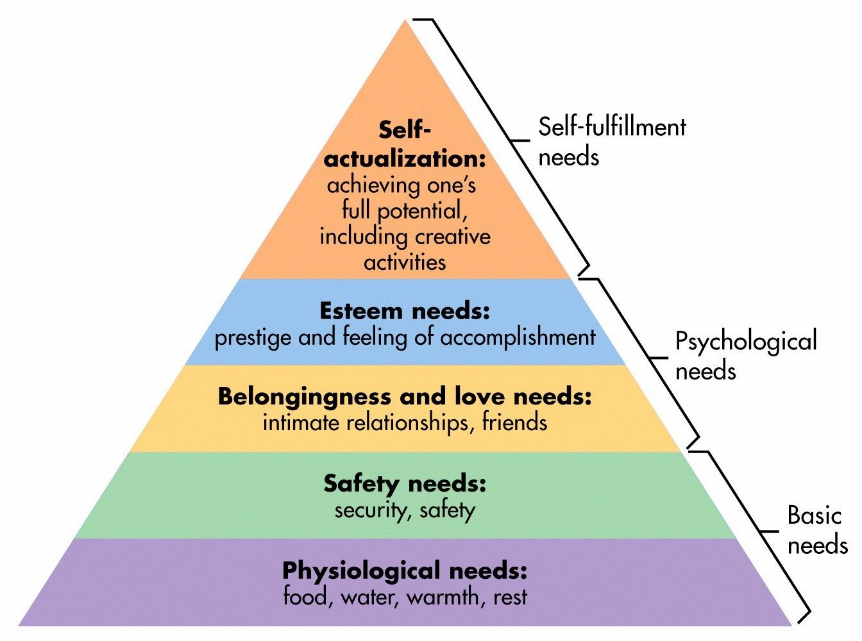 What drives you? What do you want to accomplish? What are your critical needs? These may be the most basic and crucial questions we can ask ourselves yet the most neglected.
What drives you? What do you want to accomplish? What are your critical needs? These may be the most basic and crucial questions we can ask ourselves yet the most neglected.
Much has been said about human drivers, needs, and desires. For good reason. Everyone has them. Abraham Maslow’s hierarchy of needs is perhaps the most used example which depicts basic needs such as food and shelter at the bottom and advanced needs such as achievement at the top. It is an illustration of the reality that people are always striving for something. Some strive to simply pay their rent and buy groceries. Some to gain the respect of others. Others to find meaning in life. At whatever level people live and work, they have needs.
You might remember studying the hierarchy of needs in school, but haven’t given it much attention since. Perhaps you should dust it off. Why? Why is understanding human drivers important? Why should parents care? Spouses and friends care? Sales people, managers, and business owners? For one really good reason: human needs and desires drive people’s decisions and behaviors. If you want to effectively work with, sell to, understand, read, help, or influence people, including yourself, the more you know about what drives people, the more successful you will be.
If you are a manager, hopefully you know this is the primary factor driving employee engagement, productivity, retention, and performance. Studies find that over 50 percent of employees are looking to change jobs because their needs aren’t being met. Too many managers merely focus on the numbers. They focus on what people do and the results they produce with little attention to the thoughts, needs, and desires that drive their behaviors.
Surprising to some managers is that the #1 employee need is rarely money. Of course money is important, but not as important as other drivers. Studies find the #1 need employees have is performing meaningful work and finding satisfaction in their work. Employees who don’t find meaning in their work may want more money, but rarely does money offset a lack of fulfillment. Employees who don’t find purpose and fulfillment in their work aren’t as loyal to their employers. They aren’t fully engaged, don’t give discretionary effort, and nonchalantly change jobs if another one comes along that appears more fulfilling.
How do managers and others in positions of influence learn about human needs and desires? Maslow’s hierarchy is a good start but only scratches the surface of what drives people. People are too complex and our human needs compete with each other. For example, people generally want to be comfortable, but comfort can be at odds with other goals. Enjoying good food is often at odds with maintaining health. Working hard and achieving status is at odds with spending time with family.
The good news is that while people’s needs and desires can be complex, they aren’t difficult to understand. The key is establishing a trusting relationship that enables transparent in-depth conversations. By talking with people about their priorities, goals, mission, needs, and desires, you can get a good idea of what drives people.
Once you know what drives people, you know what makes them happy and sad. You know the problems they deal with. You know how to motivate and inspire them. You know how to help make work and life meaningful for them. You can do things that satisfy their needs and desires. You can help them be more productive and fulfilled. You can influence the many variables that impact them whether they are seeking status, a sense of accomplishment, or a balanced lifestyle.
Listed below are ten needs that drive people. Identify the ones that drive you and those in your circle of influence. Consider what you can do or say to accommodate them as appropriate. When properly understood and accommodated, your people and relationships will flourish.
- Health – physical security, safety, survival, protection, reproduction
- Stability – certainty, order, organization, tranquility, reliability, dependability, quality, informed
- Autonomy – independence, freedom, individuality
- Belonging – bonding, involvement, love, connection, acceptance, companionship, relationships, affection, friendship, intimacy, identity
- Contribution – creation, mastery, doing good, helping others
- Significance – power, authority, status, honor, approval, winning, success, dignity, accomplishment, recognition, attention, fame, respect, confidence, reputation, self-assurance
- Growth – learning, curiosity, challenge, advancement
- Bargain – deal, preferential treatment, getting as much or more than others, fairness
- Pleasure – fun, comfort, convenience, avoiding pain, minimizing fear, experiences, variety
- Purpose – meaning, fulfillment, faith
